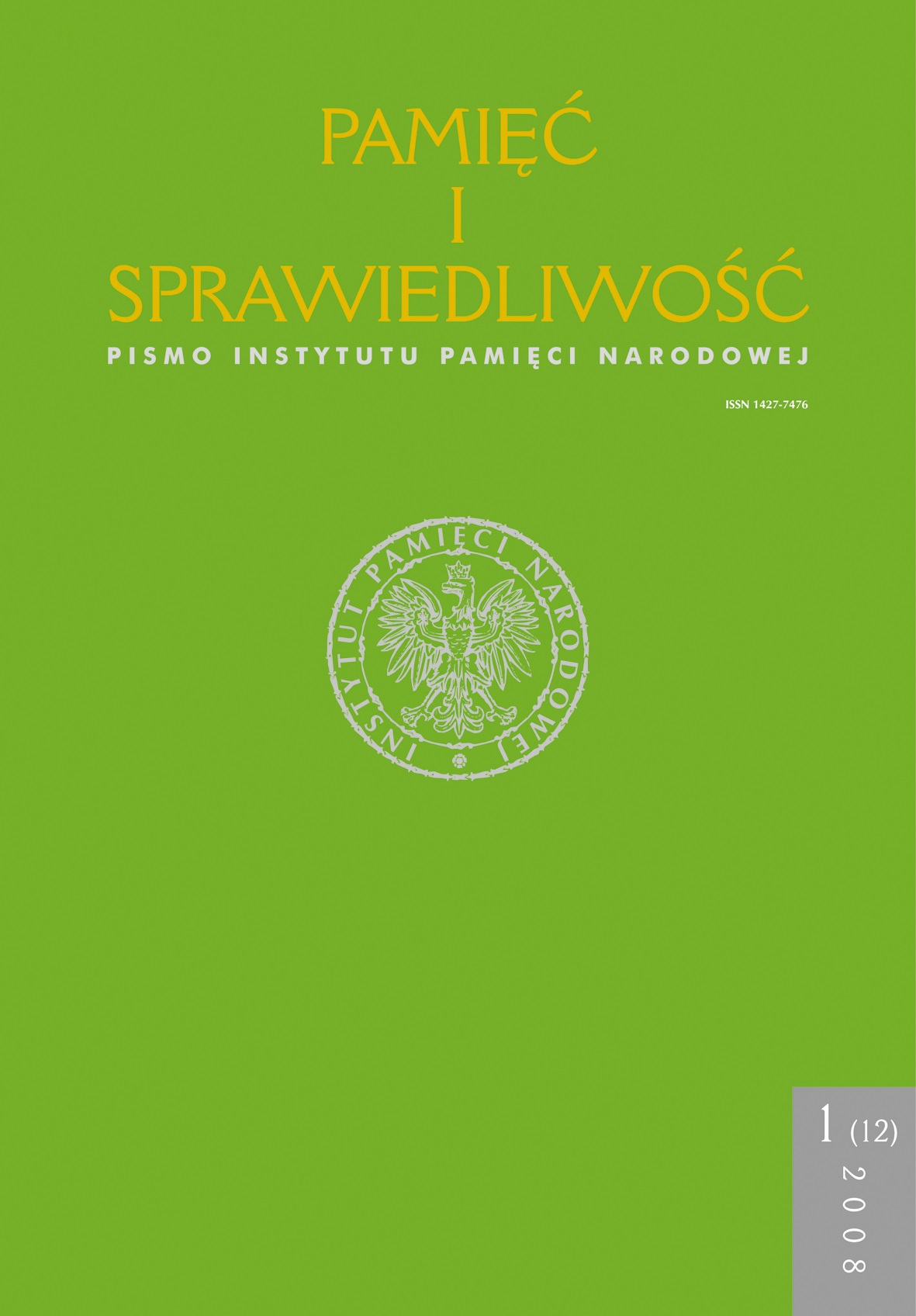Federacja jako zagrożenie. Działania wywiadu PRL wobec polskich federalistów na Zachodzie po drugiej wojnie światowej
Pamięć i Sprawiedliwość, Tom 12 Nr 1 (2008), strony: 345-367
Data publikacji: 2008-06-30
Abstrakt
The issues concerning the unifi cation of Europe, especially its central and eastern parts, occupied a central place in debates of émigré circles from the Second World War – starting from the Polish-Czechoslovak confederation and federal clubs and ending with the participation in the initiatives on behalf of the European Federation. Poles among others actively participated in the European Movement, International Peasant Union, Christian Democratic Union of Central Europe, Assembly of Captive European Nations (ACEN), they established the Polish Federalists’ Association (Związek Polskich Federalistów – ZPF), connected to the Polish Freedom Movement ‘Independence and Democracy’ and affiliated to the European Union of Federalists.
For the security apparatus of the communist Poland both the emigration and the federalist initiatives posed a threat. First of all, it was the consequence of the Moscow’s attitude. Next, the authorities in Warsaw aimed at liquidating any connections between the state and the emigration due to their platform by discrediting the latter among others by stressing the relations with foreign intelligence services and accusing them of engaging in agent network operations and ideological
sabotage.
Still, the direct actions against the circle of federalists were not carried out for a long time. It was among others conditioned by weak reconnaissance of the potential of specifi c émigré organizations. Especially at the turn of the 1940s and 1950s the diffi culties also resulted from internal changes in the functioning of the civil and military intelligence of the communist Poland. Starting with the so-called second repatriation action (1955–1956), and ending with the guidelines
of the Vice-Minister of Internal Affairs, Mieczysław Moczar of 1958 one may see that the understanding of and the knowledge about the apparatus as far as emigration structures and functioning are concerned were better and better. It gave a stimulus fi rst to keep under surveillance singular federalists (among others Zbigniew Rapacki, Tadeusz Parczewski, Jerzy Jankowski), and in 1968 also the Polish Federalists’ Association (existing from 1949!). It was a paradox that it was a decadent period of the organized activities of federalists in emigration – out of the structures operating in Great Britain, the USA and France the latter were in the best condition, the rest of them were, in fact, non-existent or their activities were very limited. No wonder that the case of the ZPF was closed very quickly – just within two years. The actions of exposing particular persons were carried out a little bit longer but they were also stopped in the fi rst half of the seventies.
Inne teksty tego samego autora
- Sławomir Łukasiewicz, Paweł Machcewicz, Paweł Sasanka, Paweł Ziętara, Rok 1956 - 60 lat później. Dyskusja z udziałem Sławomira Łukasiewicza, Pawła Machcewicza, Pawła Sasanki, Pawła Ziętary , Pamięć i Sprawiedliwość: Tom 28 Nr 2 (2016)
- Sławomir Łukasiewicz, Aparat bezpieczeństwa PRL o polskich federalistach , Pamięć i Sprawiedliwość: Tom 12 Nr 1 (2008)
- Sławomir Łukasiewicz, [Recenzja] Artur Trudzik, Polski Ruch Wolnościowy „Niepodległość i Demokracja” i jego organ prasowy „Trybuna”. Dzieje ruchu, periodyku i innych czasopism wydawanych przez PRW „NiD”, Warszawa 2009 , Pamięć i Sprawiedliwość: Tom 16 Nr 2 (2010)
- Sławomir Łukasiewicz, Partia, ideologia i wywiad polityczny. Studium funkcjonowania organizacji partyjnej w wywiadzie Ministerstwa Bezpieczeństwa Publicznego , Pamięć i Sprawiedliwość: Tom 23 Nr 1 (2014)
- Sławomir Łukasiewicz, Zimnowojenna emigracja polityczna jako przedmiot badań , Pamięć i Sprawiedliwość: Tom 15 Nr 1 (2010)
- Sławomir Łukasiewicz, Przesłuchania generała Modelskiego przed komisjami Izby Reprezentantów i Senatu USA wiosną 1949 roku , Pamięć i Sprawiedliwość: Tom 15 Nr 1 (2010)
 Język Polski
Język Polski
 English
English
 Deutsch
Deutsch
 Français (France)
Français (France)
 Italiano
Italiano
 Русский
Русский


 PDF
PDF
